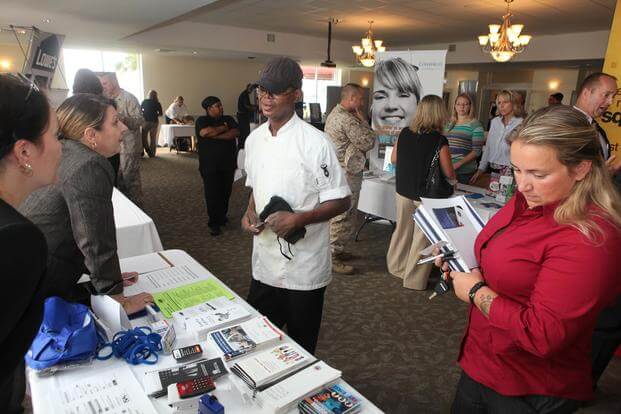President Donald Trump plans to continue to push both the federal government and private sector to hire more military spouses, a White House official said today.
"I believe the federal government and private sector separately but together have a very important role," Kellyanne Conway, a special advisor to the Trump said at a Washington D.C. spouse employment event. "If we are going to again make sure that our military and military families are properly resourced and respected, then part of that must include the employment opportunities to help those military spouses who wish to work."
Conway spoke at the 2018 Military Spouse Employment Summit hosted by the U.S. Chamber of Commerce Foundation. The event was attended by several hundred military spouses, government officials and private sector employers.
Military spouse unemployment currently hovers at about 16 percent, about four times the national average, said officials with the US Chamber of Commerce Foundation Hiring Our Heroes program.
A new Executive Order signed by Trump in May reminded agencies about a military spouse non-competitive federal hiring authority they can use to place spouses in government jobs, while also newly requiring agencies to report back on how many military spouses have been hired.
At about the same time, the Defense Department announced an upcoming overhaul to a military spouse federal hiring preference program known as PPP-S, for Priority Placement Program-Spouse.
Currently, PPP-S requires spouses to register for the preference in person at each duty station. In the future, applications will be done through the USAJobs website, officials said. That change may take place in the next several months.
Conway said the administration views hiring military spouses as both a non-partisan and a bipartisan issue. For those outside the political system, it is non-partisan, she said. But inside the White House, it is bipartisan.
"The non-partisan solutions are in this room," she told the summit's attendees. "But bi-partisan ... we need to look at this without the red-and-blue eyeglasses on."
“Now it’s time to renew our commitment to solving another pressing problem,” Dr. Jill Biden, spouse of former Vice President Joe Biden, said at the event. “Military spouses now need our focus and we need to direct our energy … to their cause.”
Military spouse employment first became a topic discussed by the White House under the Obama administration, when Biden and First Lady Michelle Obama spearheaded a program known as Joining Forces. It helped highlight spouse and veteran employment needs, among other military life topics. The Department of Defense has also long promoted military spouse employment programs through its Military OneSource section.
During the event the Chamber foundation and Starbucks rolled out a new push to work with private businesses to hire 100,000 spouses nationwide. Starbucks has previously committed to hiring 25,000 military spouses and veterans by 2025. The company says they have already made 17,000 hires towards that goal.
The Chamber foundation has also recently launched a series of "economic empowerment zones" in cities nationwide, including San Antonio, Texas and Seattle, Washington, where they work with both local government officials and businesses to encourage the hiring of military spouses stationed in the area.
One outstanding spouse employment barrier that can’t be fixed by federal officials impacts military spouses who hold professional licenses. Professional licenses are issued by individual states, so the federal government cannot create a blanket change.
And although each state has passed a law to make transferring some licenses between states easier, each rule is different and no state has a blanket policy on allowing professional licenses to cross state lines. For example, a spouse with a nursing license issued by one state may be able to use it in another, but one with a teaching license may still need to seek a new certification.
The Chamber also used the event to highlight a new study that examines potential career fields for spouses that do not require a professional licensure or advanced degree. Career fields like software development and human resources specialist are both in high demand, officials said, and uniquely suited to military spouse professionals.
-- Amy Bushatz can be reached at amy.bushatz@military.com.














